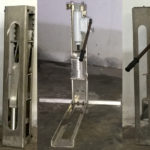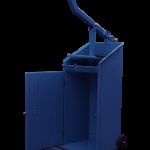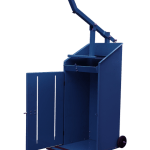Tools To Tackle Agri-Waste -“Solution To Farm Fires”
According to United Nations definition agricultural wastes are waste produced as a result of various agricultural operations. It includes manure, wastes from poultry houses and slaughterhouses; harvest waste; fertilizer run-off from fields; pesticides that enter into water, air or soils; and salt and silt drained from fields.
Also the quantity and composition of agricultural waste are dictated by the geographical and cultural aspects of a country or a region and also the extent of land used for agriculture. Regions into organic farming may produce less of water polluting chemicals. Animal manure is mostly used up. Highly populated developing regions are bound to produce more of harvest waste due to lack of infrastructure, need for multiple planting of crops and lack of awareness.
Economic aspect of waste management is the biggest spoil sport in our land. Pollution of Northern part of India is mainly due to farm-fires. Farmers in many states don’t have any option but to burn crop waste leading to heavy pollution. It seems that there is no incentive to save this green-gold but to burn it.
A Nov. 08 NASA satellite image captured the farm fires in red dots:
Stubble burning is practised by Indian farmers to easily get rid of the leftover crop following the harvest and ahead of the next sowing season.
Several solutions to use crop wastes exist but none of them are actually linked to the starting point . For example agricultural wastes can be used to make alcohol using a patented technology by an Indian company but neither the company has any enthusiasm to go to the farmer nor does the farmer have economic resources to take his waste to the plants. Some farmers have come out with innovative solutions like watering the fields and then using rotavator , zero drill or happy seeder which can take out the stubble and mix it with soil or seed along with stubble.
If the huge quantities of crop waste was somehow quickly taken out compacted and stored manually by farmers away from the fields it would give them time to plan, use and sell this very important resource. Only Monetary gains by selling this waste will motivate farmers not to burn it.
Waste coming from agricultural and industrial areas is one of the major environmental problem that leaves adverse effect on environment. This waste either dumped into sea or burnt openly in the air which spreading harmful gases and pollution. Briquette and Baling is the first step towards saving this resource which takes care of convenience and time factor both. Bailing means to com press the waste that occupies excess space and becomes difficult to handle.


Manual version of these machines can be used by anyone, are light weight and economical and do not require electricity. Waste processed in bales or briquettes need less storage land and are easier to handle. Bales and briquettes can be used for fire or sold off easily giving a source of extra income for rural families especially women.


There are numerous sources to produce renewable energy but this the best source to produce energy in an economic and biodegradable way. Briquetting machine gives biomass in a log that are cylindrical in form through usage of high pressure. Biomass briquettes produce are alternate source of fuels in comparison to orthodox sources of fossil fuels like oil, natural gas, wood, diesel etc. In this low energy fuel can be transformed into high density fuel at a briquette machine. It is a method of converting waste material into best product without creating any environmental problem. Bio fuel briquettes are cheaper source of energy and used in various industries for their different purposes.
According to environmentalists, the biofuel generated from agro waste material is a great source of income for poor farmers in India. Making farmers aware of existence of such simple machines and the monetary gains from waste is needed.
(Author-Darshil is marketing head SK engineers one of the leading companies in the engineering industry. S.K. Engineers works with Non-Governmental Organizations (NGOs), Foundations and various social organizations that work for the cause of rural upbringing and SDGs. The company provides solutions for the proper management of various types of waste including Agro/Forest Waste, Paper/Plastic/Cardboard Waste, Food Waste, etc.
www.skengineers.org)
Features Image from Pixabay





